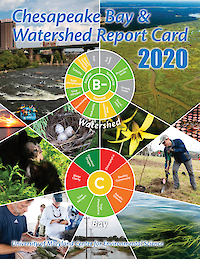2021: a year in review
IAN productivity remained high in 2021. Through staff changes and the ongoing COVID-19 pandemic, we continued to collaborate effectively with partners across the globe to assess and encourage respsonsible environmental stewardship. Report cards, newsletters, and workshops forged ahead, many the result of long-standing productive partnerships. Thank you to all of our collaborators, partners, colleagues, and staff for a great year, and here's to another great year in 2022!
Online professional certificate in environmental management for sustainability

This year, we launched our first professional certificate program in Environmental Management for Sustainability on EdX, an online learning platform for open online courses. All four courses are self-paced and available in five languages (English, Spanish, Filipino, Japanese, and Hindi). A professional certificate is available for verified learners, and all content is available for free. For more information, visit our certificate page on EdX.
2020 Chesapeake Bay Report Card

The Cheapeake Bay itself received a moderate score (C), a slight increase from 2019. The Chesapeake Watershed was scored separately, including several new socioeconomic indicators, and received a good score (B-). The new socio-economic indicators attempt to address the question of equity in the Chesapeake Bay Watershed. As part of this effort, a MEES course started work on developing a Chesapeake Environmental Justice Index framework. Environmental justice requires providing fair treatment and meaningful involvement of all people, regardless of race, color, national origin, or income, with respect to the environment.
Notable publications and projects from 2021
- Bhitarkanika Conservation Area Report Card: This region in northeastern India includes several protected areas, including a national park and wildlife sanctuaries. Overall, Bhitarkanika is in "good" condition (88%).
- Coastal Georgia Report Card: The seventh Coastal Georgia Report Card updates indicators and methods. Overall, Coastal Georgia received a "good" score (77%).
- Chesapeake Monitoring Cooperative Achievement Report: A summary report highlights the amazing partnerships, collaborations, and accomplishments of the Chesapeake Monitoring Cooperative over the last six years.
- USGS Chesapeake Science Strategy: This document summarizes goals and accomplishments towards implementing USGS's four integrated science themes for the Chesapeake Bay region.
- Darwin Harbour 2021 Integrated Report Card: The Harbour and its catchment received an overall score of B- (good), indicating that more can be done to better understand and improve the region.
- BlueTech Maryland Consortium: The consortium will collaborate on technological innovations in aquaculture, offshore wind, flood management, sustainable ports, urban waterfronts, and climate change.
- Chesapeake Behavior Change: Explore the site to learn about the Stewardship Index Survey, its finding, and how to use them to create an effective behavior change campaign.
- COAST Card partnership: The Coastal Ocean Assessment for Sustainability and Transformation (COAST) Card is an international, transdisciplinary research program seeking to foster solutions to global sustainability challenges. This project brings together researchers from the USA, Japan, Philippines, Norway, and India. COAST Card merges three tools: socio-ecological network analyses; socio-environmental report cards; and system dynamics models. This ongoing partnership made progress in 2021 with newsletters and meetings.

